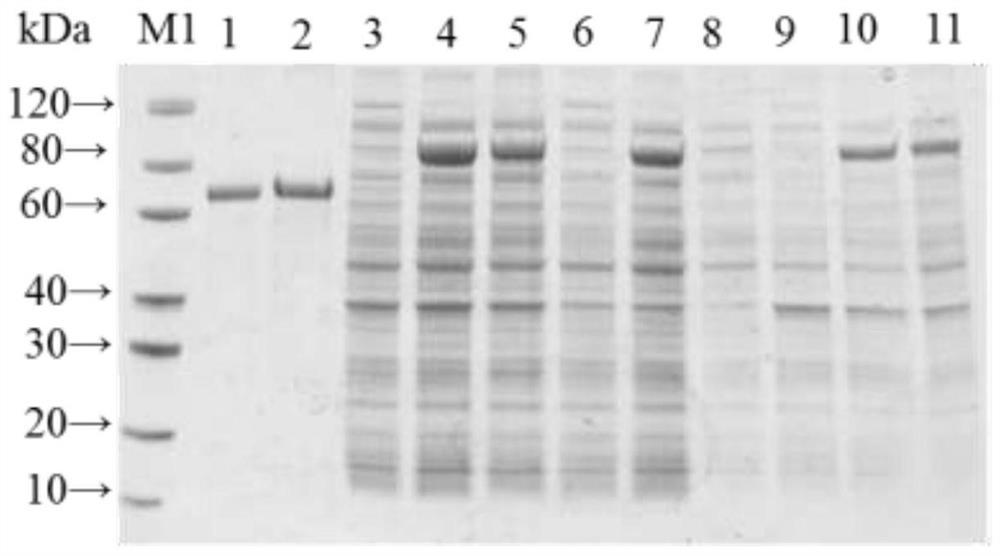A kind of avirulent c-type Clostridium botulinum genetic engineering subunit vaccine and its production method
A Clostridium botulinum and toxin technology, which is applied in vaccines, DNA/RNA vaccination, antibacterial drugs, etc., can solve the problems of difficulty in improving the refolding rate, and achieve the effects of maintaining effectiveness, high expression, and good immune efficacy
- Summary
- Abstract
- Description
- Claims
- Application Information
AI Technical Summary
Problems solved by technology
Method used
Image
Examples
Embodiment 1
[0076] ——Construction, expression and identification of Escherichia coli BL / BoM strain
[0077] 1. Coding rMBP-BoH C synthesis of genes
[0078] This application is based on the avirulence region H of maltoglycoprotein (MBP) and Clostridium botulinum toxin C (BoH C ) of the natural coding gene sequence (sequence 1), which was concatenated after codon optimization, and the coding sequence of the 6×His tag used was added at the 3' end of the concatenated gene. The gene sequence was synthesized by chemical synthesis method, GMBPBoH C . The specific nucleic acid sequence is shown in SEQ ID No.2, and the amino acid sequence is shown in SEQ ID No.3.
[0079] Sequence 1 (Clostridium botulinum toxin heavy chain amino acid sequence)
[0080]
[0081]
[0082] Sequence 2 (coding recombinant clostridium botulinum toxin (rMBP-BoH C ) gene nucleotide sequence)
[0083]
[0084]
[0085] Sequence 3 (recombinant Clostridium botulinum toxin (rMBP-BoH C ) amino acid sequen...
Embodiment 2
[0100] ——rMBP-BoH C expression and identification of
[0101] 1. rMBP-BoH C The expression of genetically engineered bacteria Escherichia coli BL / BoM strain was inoculated in 3 mL of LB liquid medium containing kanamycin, placed in 37 ° C shaking culture, when OD 600 When the temperature is 0.6-0.8, add IPTG solution with a final concentration of 0.5mM and place at 37°C and 15°C for induction and culture for 4h and 16h, respectively. After the bacterial culture was completed, the bacterial cells were collected by centrifugation, and the bacterial cells were resuspended at a ratio of 10 mL of lysate [0.02 mol / L Tris buffer (pH 7.2), 0.3 mol / L NaCl] per gram of bacterial body weight, and placed in an ice-water bath. The bacteria were disrupted by ultrasonic for 30 minutes, the crushing conditions were: working for 9s, resting for 9s, and the ultrasonic power was 400W. The crushed bacterial liquid was centrifuged at 12000r / min for 10min at 4°C, and the supernatant was collecte...
Embodiment 3
[0104] ——rMBP-BoH C purification of
[0105] Inoculate the genetically engineered Escherichia coli BL / BoM strain in 1L of LB liquid medium containing kanamycin for fermentation culture, shake culture at 37°C until OD 600 When the temperature is 0.6-0.8, adjust the temperature to 15°C, add IPTG solution with a final concentration of 0.5mM to induce culture for 4h. After the bacterial culture was completed, the bacterial cells were collected by centrifugation, and the bacterial cells were collected by centrifugation at 5000r / min for 5min, and 10ml of lysate (pH value 7.2 0.02mol / L Tris buffer solution, 0.3mol / L NaCl) was added per gram of bacterial cell wet weight. Proportionally resuspend the bacteria, and break the bacteria three times with a low-temperature high-pressure homogenizer at a pressure of 800 bar at 4°C. The lysate was centrifuged at 10,000 r / min at 4°C for 30 min, and the supernatant was collected. According to the instruction manual of the Ni-IDA affinity chrom...
PUM
 Login to View More
Login to View More Abstract
Description
Claims
Application Information
 Login to View More
Login to View More - R&D
- Intellectual Property
- Life Sciences
- Materials
- Tech Scout
- Unparalleled Data Quality
- Higher Quality Content
- 60% Fewer Hallucinations
Browse by: Latest US Patents, China's latest patents, Technical Efficacy Thesaurus, Application Domain, Technology Topic, Popular Technical Reports.
© 2025 PatSnap. All rights reserved.Legal|Privacy policy|Modern Slavery Act Transparency Statement|Sitemap|About US| Contact US: help@patsnap.com



